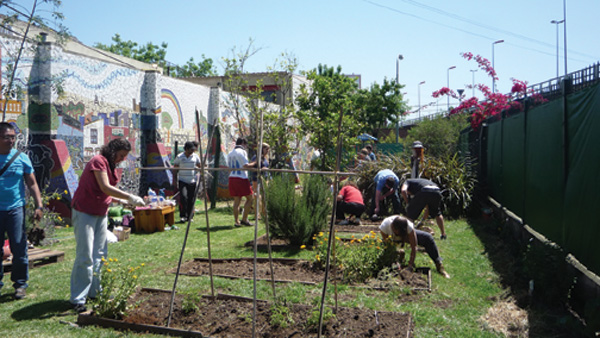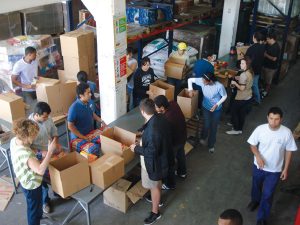
A group of MBA students built and planted vegetable gardens at a children's home in Buenos Aires during their Global Leadership trip to Argentina.
Tulane University has built a national reputation for public service in recent years. Now, thanks to a group of Freeman School MBA students, that reputation is poised to go global.
During the MBA Global Leadership class trip to Buenos Aires in November, 50 students volunteered their time to participate in a day of public service. One group of MBA students built and planted vegetable gardens at a children’s home on behalf of Huerta Niño, an organization that works to combat child malnutrition by supporting the development of kitchen gardens. Another group worked with Banco de Alimentos, a food bank, to prepare and distribute healthy meals to children at a local elementary school.

Another group of students packed boxes of food at the warehouse of Fundacion Banco de Alimentos, a food bank in Buenos Aires, then helped serve meals at one of the organizations supplied by the foundation, a local elementary school.
While the projects were completely voluntary and on top of an already busy academic schedule of lectures and site visits, over half the class opted to participate.
“I wanted to work on the gardening project because I felt that it would be a way to make a lasting difference,” says Karen Goldman (MBA ’11). “It was very satisfying to know we left something behind in Argentina that helped someone else.”
“The service projects were a great way to expose MBA students to some of the challenges of poverty,” adds Patricio Campuzano (MBA ’11). “Business is never just business. It’s very personal, and there are many people who are going to be affected by our decisions as managers. I think projects like this help remind us of that. If your success means someone else’s failure, then maybe it’s not a success after all.”
While the donation of labor provided the organizations with some much-needed assistance, an even bigger contribution may have been the second half of the assignment. In keeping with Tulane’s model of service learning, which focuses on enabling students to apply their academic knowledge to address social issues, Associate Dean for Graduate Programs John Howard asked each of the volunteers to write a paper with business recommendations for the organizations based on what he or she had observed.
“My main interest was to get the students to apply some of their business expertise and experience,” says Howard. “We do have management capacity, so why can’t we apply that in a humanistic way? As business people, we want everybody to be above subsistence level and productive. It helps the labor pool, it helps the economy, and businesses can’t operate without some attention to the bottom of the pyramid. I think more and more businesses are starting to realize that you do well by doing good.”


